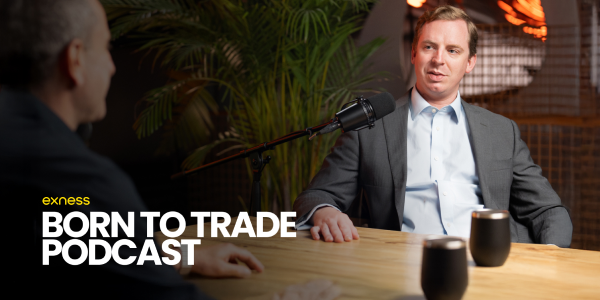BROKERS NEWS
Speed, execution, and stability: Exness’ Michael Stark on why control in trading matters

The importance of control in trading is often misunderstood. While traders cannot control the markets, they can control their decisions, risk exposure, and execution strategy. In the latest episode of the Born To Trade Podcast, Exness Financial Content Leader Michael Stark returns to discuss a crucial but often overlooked aspect of trading: control.
In his conversation with host Nima Siar, Michael discusses how execution speed, platform stability, and emotional discipline affect a trader’s ability to stay in control and why they matter more than you think.
Control in trading: The reality versus the illusion
“You certainly can’t control the markets, but what you can control is your exposure to them,” Michael explains. Whether a trader decides to buy, sell, or wait—it’s their choice. The challenge begins once the trade is open.
“When a position is open, maybe it’s going to go well, maybe it’s going to go badly. But when it goes badly, the emotional side takes over,” he says. That’s when traders risk falling into revenge trading or overtrading. According to Michael, this is the point where control becomes psychological. Taking a step back and learning from the loss is what separates consistent traders from impulsive ones.
Execution speed: The silent key differentiator
For traders active during news events like the NFP, execution speed is a make-or-break factor. "If you're trading important economic news, it's critical to have the trade executed as soon as possible," says Michael.
Using gold as an example, he highlights Exness’s advantage: “If you compare how Exness executes gold trades around NFP, it’s faster than all the main competitors. A few milliseconds or seconds can impact whether you get your intended price or one that is much worse, impacting the overall profitability of the trade.”
Michael recalls the frustration of poor execution, “You’re clicking the button to buy, clicking it and clicking it, waiting 20–25 seconds... and then suddenly 10 orders open at once.” He says this kind of delay is where control is lost.
Fast and precise execution prevents these situations and allows traders to act on their strategies without delays.
Spreads vs. execution: Which matters more?
Traders often ask whether lower spreads or faster execution is more important. Michael doesn’t hesitate: “Execution speed is far more important than just low spreads. If your order execution is delayed, the best spread in the world won’t help you.”
By the time the order goes through, the market may have moved. That delay could turn a winning trade into a loss. “You don't want to completely lose control when that happens.”
That’s why traders must look beyond spreads alone and consider overall platform performance.
The hidden cost of slippage
One of the biggest concerns for traders is slippage–when the final execution price is different from the intended price. While some slippage is unavoidable in fast-moving markets, excessive slippage can raise questions.
“Can you trade without slippage?” Nima asks. Michael’s response is straightforward: “No. Slippage is part of any financial market”. However, he explains that brokers should minimize it as much as possible. “A financial market without slippage is impossible, but excessive slippage is unacceptable.” The goal isn’t to eliminate slippage—it’s to ensure it’s reasonable–real or manipulated.
To check slippage and verify the broker’s execution quality, Michael suggests reviewing the broker’s tick history. If a broker consistently shows worse execution, higher spreads, and more slippage compared to competitors, he cautions, it could be a red flag. "I don't know too many brokers that give their tick history or want to give it. ” Only a handful of brokers share tick history, and Exness is one of them.
Final thoughts
Throughout the episode, Michael emphasizes that real control in trading comes down to three things: execution speed, reliable order fulfillment, and platform stability.
“If your platform isn’t responsive, or your trades execute late, you’re out of control. For traders, feeling out of control is both financially and psychologically damaging.” Watch Episode 3 of the Born to Trade podcast with Michael Stark to listen to the full conversation here.
Promoted content